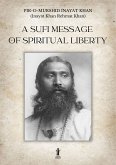Inayat Khan (1882-1927) was a prominent Sufi teacher and musician who founded the Sufi Order International in 1910. Born in Baroda, India, he was the son of a well-known musician and Sufi saint. Inayat Khan studied music, philosophy, and mysticism from a young age, and he became a master musician and composer.
In 1910, Inayat Khan left India to spread the teachings of Sufism in the West. He first traveled to the United States, where he gave lectures and performances on Sufi philosophy and music. He then traveled to England, where he established the Sufi Order International, which sought to promote spiritual liberty and inner awakening through the practice of Sufi principles.
Inayat Khan's teachings emphasized the importance of universal spirituality and the unity of all religions. He believed that the essence of all spiritual traditions was the same, and that the differences between them were merely the result of cultural and historical factors.
In addition to his teachings, Inayat Khan was also a renowned musician who played the sitar, veena, and other traditional Indian instruments. He integrated music into his Sufi teachings, using it as a means to connect with the divine and to convey the spiritual message of Sufism.
Inayat Khan's legacy continues to inspire many people today, both through his teachings and through the Sufi Order International, which remains a prominent organization dedicated to promoting the principles of Sufism and universal spirituality.
Dieser Download kann aus rechtlichen Gründen nur mit Rechnungsadresse in A, B, BG, CY, CZ, D, DK, EW, E, FIN, F, GR, HR, H, IRL, I, LT, L, LR, M, NL, PL, P, R, S, SLO, SK ausgeliefert werden.









